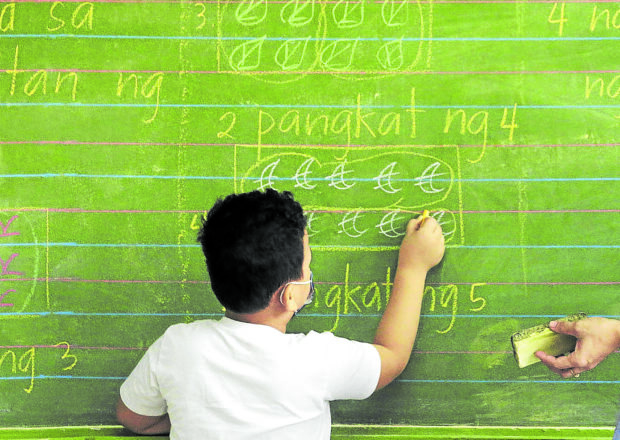
INQUIRER FILE PHOTO / GRIG C. MONTEGRANDE
MANILA, Philippines — Education advocacy groups have raised concerns about the unacceptable practice of student “mass promotion” among public school teachers, citing compliance with the Department of Education’s (DepEd) “No Child Left Behind” policy.
The Philippine Business for Education (PBEd), an advocacy group, revealed in a recent basic education consultancy conducted among public school teachers that approximately 10 to 30 percent of students who are recommended to proceed to the next grade level lack the required basic competency for advancement.
READ: ‘Mass promotion’ hurts learning quality – PBEd
“We found out from the teachers, walang data ito kasi hindi ito reported, hindi kino collect ang data pero on the ground conversations o kinukwento nila… pinapasa nila sa mas mataas na grade level ang mga estudyante kahit na hindi pa naman handa ang mga ito. Nangyayari ito sa ilang paaralan,” said Justine Raagas, executive director of PBEd.
(We found out from the teachers, there is no data on this because it was not reported, data is not being collected, but through on-the-ground conversations or their stories, they pass on students to higher grade levels even if they are not yet prepared. This happens in some schools.)
Raagas said an estimated 10 to 30 percent of students who are endorsed for enrolment in the next level “actually don’t meet the competency level.”
Alliance of Concerned Teachers (ACT) chairman Vladimir Quetua said the practice of mass promotion of students seem to be an offshoot of miscommunication or misinterpretation by some teachers of the DepEd’s “No child left behind” policy.
“Tila iba ang pang-unawa ng ibang guro sa DepEd policy na ‘No child left behind’ na nauuuwi sa mass promotion o maramihang pagpasa ng mga estudyante,” Quetua said.
(It seems that some teachers have a different understanding of the DepEd policy “No child left behind,” which results in mass promotion or the widespread passing of students.)
Quetua said that in these instances, “nasisisi ang mga teachers kaya napipilitan na lang silang ipasa ang mga estudyante [Teachers are being blamed, so they are forced to just pass the students].”
Both PBED and ACT stressed that the practice would have an adverse impact on the learning capacities of students in the next grade level and when they go to college, which could ultimately limit their employment capabilities.
PBEd likewise said this would affect the Philippines’ standing in international assessments.
DepEd spokesperson Michael Poa said the DepEd has no policy on the mass promotion of students.
“The DepEd has no issuance that allows for mass promotion. We understand that in the field, maaaring nangyayari ‘yung ganyan and that’s why that is something we are looking into in terms of ano ba ‘yung mga rason [It is possible that such situations occur, and that is why we are looking into the reasons behind them],” Poa said.
Raagas said that to stop the practice, the DepEd should lessen the workload of teachers so they can focus on teaching and assessing the competencies of their students.
“We need to address this issue. We have started showing one of the manifestations of this unacceptable practice: the learning poverty rate in the country has been rising,” she stressed.
RELATED STORY:
‘Mass promotion’ hurts learning quality – PBEd